Habib Tanvir est un Acteur et Producteur Indien né le 1 septembre 1923 à Raipur (Inde)
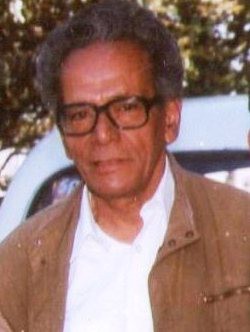
Habib Tanvir (1 September 1923 – 8 June 2009) was one of the most popular Indian Urdu, Hindi playwrights, a theatre director, poet and actor. He was the writer of plays such as, Agra Bazar (1954) and Charandas Chor (1975). A pioneer in Urdu, Hindi theatre, he was most known for his work with Chhattisgarhi tribals, at the Naya Theatre, a theatre company he founded in 1959 in Bhopal. He went on to include indigenous performance forms such as nacha, to create not only a new theatrical language, but also milestones such as Charandas Chor, Gaon ka Naam Sasural, Mor Naam Damad and Kamdeo ka Apna Basant Ritu ka Sapna.
For him true "theatre of the people" existed in the villages, which he strived to bring to the urban "educated", employing both folk performers as actors alongside urban actors. He died on 8 June 2009 at Bhopal after a three-week-long illness. Upon his death, he was the last of pioneering actor-managers in Indian theatre, which included Sisir Bhaduri, Utpal Dutt and Prithviraj Kapoor, and often he managed plays with a mammoth cast, such as Charandas Chor which included an orchestra of 72 people on stage and Agra Bazaar with 52 people.
During his lifetime he won several national and international awards, including the Sangeet Natak Akademi Award in 1969, Padma Shri in 1983, Kalidas Samman 1990, Sangeet Natak Akademi Fellowship in 1996, and the Padma Bhushan in 2002. Apart from that he had also been nominated to become a member of the Upper House of Indian Parliament, the Rajya Sabha (1972–1978). His play 'Charandas Chor' (Charandas, The Thief) won him the Fringe Firsts Award at Edinburgh International Drama Festival in 1982, and in 2007, it was included in the Hindustan Times' list of 'India's 60 Best works since Independence which said : "an innovative dramaturgy equally impelled by Brecht and folk idioms, Habib Tanvir seduces across language barriers in this his all-time biggest hit about a Robin Hood-style thief" as .
Born in Raipur, Chhattisgarh(erstwhile Madhya Pradesh) to Hafiz Ahmed Khan, who hailed from Peshawar.
He passed his matriculation from Laurie Municipal High School, Raipur, and later completed his B.A. from Morris College, Nagpur in 1944. Thereafter he studied M.A. for a year at Aligarh Muslim University.
Early in life, he started writing poetry using his pen name takhalluz. Soon after, he assumed his name, Habib Tanvir.
Career
In 1945, he moved to Bombay, and joined All India Radio (AIR) Bombay as a producer. While in Bombay, he wrote songs for Urdu, Hindi films and even acted in a few of them. He also joined the Progressive Writers' Association (PWA) and became an integral part of Indian People's Theatre Association (IPTA) as an actor. Later, when most of the prominent IPTA members were imprisoned for opposing the British rule, he was asked to take over the organisation.
In 1954, he moved to New Delhi, and worked with Qudsia Zaidi's Hindustani Theatre, and also worked with Children's theatre, where he authored many plays. Later in the same year, he produced his first significant play 'Agra Bazar' based on the works and times of the plebeian 18th-century Urdu poet, Nazir Akbarabadi, an older poet in the generation of Mirza Ghalib. For this play he brought together local residents and folk artistes from Okhla village in Delhi and students of Jamia Millia Islamia creating a palette never seen before in Indian theatre. Additionally, the play was not staged in a confined space, rather a bazaar, a marketplace. After this, he continued to work with non-trained actors and folk artistes like the folk artists of Chhattisgarh.
Stay in Europe
In 1955, when he was in his 30s, Habib moved to England. There, he trained in Acting at Royal Academy of Dramatic Arts (RADA) (1955) and in Direction at Bristol Old Vic Theatre School (1956). For the next two years, he travelled through Europe, watching various theatre activities. One of the highlights of this period, was his eight-month stay in Berlin in 1956, during which he got to see several plays of Bertolt Brecht, produced by Berliner Ensemble, just a few months after Brecht's death. This proved to have a lasting influence on him, as in the coming years, he started using local idioms in his plays, to express trans-cultural tales and ideologies. This, over the years, gave rise to a 'theatre of roots', which was marked by an utter simplicity in style, presentation and technique, yet remaining eloquent and powerfully experiential.
Return to India
A deeply inspired Habib returned to India in 1958 and took to directing full-time. He produced, 'Mitti ki Gaadi' a post-London play, based on Shudraka's Sanskrit work, Mrichakatika. It became his first important production in Chhattisgarhi. This was the result of the work he had been doing since his return – working with six folk actors from Chhattisgarh. He went on to found 'Naya Theatre,' a theatre company in 1959.
In his exploratory phase, i.e. 1970–73, he broke free from one more theatre restriction – he no longer made the folk artistes, who had been performing in all his plays, speak Hindi. Instead, the artistes switched to Chhattisgarhi, a local language they were more accustomed to. Later, he even started experimenting with 'Pandavani', a folk singing style from the region and temple rituals. This made his plays stand out amidst the gamut of plays which still employed traditional theatre techniques like blocking movements or fixing lights on paper. Spontaneity and improvisation became the hallmark of his new theatre style, where the folk artistes were allowed greater freedom of expression.
His next venture with Chhattisgarhi Nach style, saw another breakthrough in 1972, with a staging of the play titled 'Gaon Ka Naam Sasural, Mor Naam Damaad'. This was based on a comic folk tale, where an old man falls in love with a young woman, who eventually elopes with another young man.
By the time he produced his seminal play, 'Charandas Chor' in 1975, the technique became popular. This play immediately established a whole new idiom in modern India theatre; whose highlight was Nach – a chorus that provided commentary through song. Later, he collaborated with Shyam Benegal, when he adapted the play to a feature-length film, by the same name, starring Smita Patil and Lalu Ram. In 1980, he directed the play Moti Ram ka Satyagraha for Janam (Jan Natya Manch) on the request of Safdar Hashmi.
During his career, Habib has acted in over nine feature films, including Richard Attenborough's film, Gandhi (1982), 'Black and White' and in a yet-to-be-released film on the Bhopal gas tragedy.
His first brush with controversy came about in the 1990s, with his production of a traditional Chhattisgarhi play about religious hypocrisy, 'Ponga Pandit'. The play was based on a folk tale and had been created by Chhattisgarhi theatre artists in the 1930s. Though he had been producing it since the sixties, in the changed social climate after the Babri Masjid demolition, the play caused quiet an uproar amongst Hindu fundamentalists, especially the Rashtriya Swayamsewak Sangh (RSS), whose supporters disrupted many of its shows, and even emptied the auditoriums, yet he continued to show it all over.
His Chhatisgarhi folk troupe, surprised again, with his rendition of Asghar Wajahat's 'Jisne Lahore Nahin Dekhya' in 1992. Then in 1993 came, 'Kamdeo Ka Apna Basant Ritu Ka Sapna', Tanvir's Hindi adaptation of Shakespeare's "A Midsummer Night's Dream". In 1995, he was invited to the United States by the Chicago Actors Ensemble, where he wrote his only English language play, 'The Broken Bridge'. In 2002, he directed, 'Zahareeli Hawa', a translation of 'Bhopal' by the Canadian-Indian playwright Rahul Varma, based on the Bhopal Gas Tragedy. During his illustrious career he brought works from all genres to stage, from ancient Sanskrit works by Sudrak, Bhasa, Visakhadatta and Bhavabhuti; to European classics by Shakespeare, Molière and Goldoni; modern masters Brecht, Garcia, Lorca, Gorky, and Oscar Wilde; Tagore, Asghar Wajahat, Shankar Shesh, Safdar Hashmi, Rahul Varma, stories by Premchand, Stefan Zweig and Vijaydan Detha, apart from an array of Chhattisgarhi folk tales.
Source : Wikidata
Habib Tanvir

- Infos
- Photos
- Meilleurs films
- Famille
- Personnages
- Récompenses
Nom de naissance Habib Ahmed Khan
Nationalité Inde
Naissance 1 septembre 1923 à Raipur (Inde)
Mort 8 juin 2009 (à 85 ans) à Bhopal (Inde)
Récompenses Padma Shri, Padma Bhushan, Sangeet Natak Akademi Award
Nationalité Inde
Naissance 1 septembre 1923 à Raipur (Inde)
Mort 8 juin 2009 (à 85 ans) à Bhopal (Inde)
Récompenses Padma Shri, Padma Bhushan, Sangeet Natak Akademi Award
For him true "theatre of the people" existed in the villages, which he strived to bring to the urban "educated", employing both folk performers as actors alongside urban actors. He died on 8 June 2009 at Bhopal after a three-week-long illness. Upon his death, he was the last of pioneering actor-managers in Indian theatre, which included Sisir Bhaduri, Utpal Dutt and Prithviraj Kapoor, and often he managed plays with a mammoth cast, such as Charandas Chor which included an orchestra of 72 people on stage and Agra Bazaar with 52 people.
During his lifetime he won several national and international awards, including the Sangeet Natak Akademi Award in 1969, Padma Shri in 1983, Kalidas Samman 1990, Sangeet Natak Akademi Fellowship in 1996, and the Padma Bhushan in 2002. Apart from that he had also been nominated to become a member of the Upper House of Indian Parliament, the Rajya Sabha (1972–1978). His play 'Charandas Chor' (Charandas, The Thief) won him the Fringe Firsts Award at Edinburgh International Drama Festival in 1982, and in 2007, it was included in the Hindustan Times' list of 'India's 60 Best works since Independence which said : "an innovative dramaturgy equally impelled by Brecht and folk idioms, Habib Tanvir seduces across language barriers in this his all-time biggest hit about a Robin Hood-style thief" as .
Biographie
Early lifeBorn in Raipur, Chhattisgarh(erstwhile Madhya Pradesh) to Hafiz Ahmed Khan, who hailed from Peshawar.
He passed his matriculation from Laurie Municipal High School, Raipur, and later completed his B.A. from Morris College, Nagpur in 1944. Thereafter he studied M.A. for a year at Aligarh Muslim University.
Early in life, he started writing poetry using his pen name takhalluz. Soon after, he assumed his name, Habib Tanvir.
Career
In 1945, he moved to Bombay, and joined All India Radio (AIR) Bombay as a producer. While in Bombay, he wrote songs for Urdu, Hindi films and even acted in a few of them. He also joined the Progressive Writers' Association (PWA) and became an integral part of Indian People's Theatre Association (IPTA) as an actor. Later, when most of the prominent IPTA members were imprisoned for opposing the British rule, he was asked to take over the organisation.
In 1954, he moved to New Delhi, and worked with Qudsia Zaidi's Hindustani Theatre, and also worked with Children's theatre, where he authored many plays. Later in the same year, he produced his first significant play 'Agra Bazar' based on the works and times of the plebeian 18th-century Urdu poet, Nazir Akbarabadi, an older poet in the generation of Mirza Ghalib. For this play he brought together local residents and folk artistes from Okhla village in Delhi and students of Jamia Millia Islamia creating a palette never seen before in Indian theatre. Additionally, the play was not staged in a confined space, rather a bazaar, a marketplace. After this, he continued to work with non-trained actors and folk artistes like the folk artists of Chhattisgarh.
Stay in Europe
In 1955, when he was in his 30s, Habib moved to England. There, he trained in Acting at Royal Academy of Dramatic Arts (RADA) (1955) and in Direction at Bristol Old Vic Theatre School (1956). For the next two years, he travelled through Europe, watching various theatre activities. One of the highlights of this period, was his eight-month stay in Berlin in 1956, during which he got to see several plays of Bertolt Brecht, produced by Berliner Ensemble, just a few months after Brecht's death. This proved to have a lasting influence on him, as in the coming years, he started using local idioms in his plays, to express trans-cultural tales and ideologies. This, over the years, gave rise to a 'theatre of roots', which was marked by an utter simplicity in style, presentation and technique, yet remaining eloquent and powerfully experiential.
Return to India
A deeply inspired Habib returned to India in 1958 and took to directing full-time. He produced, 'Mitti ki Gaadi' a post-London play, based on Shudraka's Sanskrit work, Mrichakatika. It became his first important production in Chhattisgarhi. This was the result of the work he had been doing since his return – working with six folk actors from Chhattisgarh. He went on to found 'Naya Theatre,' a theatre company in 1959.
In his exploratory phase, i.e. 1970–73, he broke free from one more theatre restriction – he no longer made the folk artistes, who had been performing in all his plays, speak Hindi. Instead, the artistes switched to Chhattisgarhi, a local language they were more accustomed to. Later, he even started experimenting with 'Pandavani', a folk singing style from the region and temple rituals. This made his plays stand out amidst the gamut of plays which still employed traditional theatre techniques like blocking movements or fixing lights on paper. Spontaneity and improvisation became the hallmark of his new theatre style, where the folk artistes were allowed greater freedom of expression.
His next venture with Chhattisgarhi Nach style, saw another breakthrough in 1972, with a staging of the play titled 'Gaon Ka Naam Sasural, Mor Naam Damaad'. This was based on a comic folk tale, where an old man falls in love with a young woman, who eventually elopes with another young man.
By the time he produced his seminal play, 'Charandas Chor' in 1975, the technique became popular. This play immediately established a whole new idiom in modern India theatre; whose highlight was Nach – a chorus that provided commentary through song. Later, he collaborated with Shyam Benegal, when he adapted the play to a feature-length film, by the same name, starring Smita Patil and Lalu Ram. In 1980, he directed the play Moti Ram ka Satyagraha for Janam (Jan Natya Manch) on the request of Safdar Hashmi.
During his career, Habib has acted in over nine feature films, including Richard Attenborough's film, Gandhi (1982), 'Black and White' and in a yet-to-be-released film on the Bhopal gas tragedy.
His first brush with controversy came about in the 1990s, with his production of a traditional Chhattisgarhi play about religious hypocrisy, 'Ponga Pandit'. The play was based on a folk tale and had been created by Chhattisgarhi theatre artists in the 1930s. Though he had been producing it since the sixties, in the changed social climate after the Babri Masjid demolition, the play caused quiet an uproar amongst Hindu fundamentalists, especially the Rashtriya Swayamsewak Sangh (RSS), whose supporters disrupted many of its shows, and even emptied the auditoriums, yet he continued to show it all over.
His Chhatisgarhi folk troupe, surprised again, with his rendition of Asghar Wajahat's 'Jisne Lahore Nahin Dekhya' in 1992. Then in 1993 came, 'Kamdeo Ka Apna Basant Ritu Ka Sapna', Tanvir's Hindi adaptation of Shakespeare's "A Midsummer Night's Dream". In 1995, he was invited to the United States by the Chicago Actors Ensemble, where he wrote his only English language play, 'The Broken Bridge'. In 2002, he directed, 'Zahareeli Hawa', a translation of 'Bhopal' by the Canadian-Indian playwright Rahul Varma, based on the Bhopal Gas Tragedy. During his illustrious career he brought works from all genres to stage, from ancient Sanskrit works by Sudrak, Bhasa, Visakhadatta and Bhavabhuti; to European classics by Shakespeare, Molière and Goldoni; modern masters Brecht, Garcia, Lorca, Gorky, and Oscar Wilde; Tagore, Asghar Wajahat, Shankar Shesh, Safdar Hashmi, Rahul Varma, stories by Premchand, Stefan Zweig and Vijaydan Detha, apart from an array of Chhattisgarhi folk tales.
Le plus souvent avec
Filmographie de Habib Tanvir (11 films)
Acteur

Black & White (2008)
, 2h18Réalisé par Subhash Ghai
Genres Drame, Action
Thèmes Le terrorisme
Acteurs Anil Kapoor, Shefali Shah, Anurag Sinha, Aditi Sharma, Habib Tanvir, Akash Chandra Khurana
Rôle Qazi Saab
Note61%





Rajan Mathur (Anil Kapoor) is a Urdu professor who lives in Chandni Chowk district in New Delhi, with his wife Roma Mathur (Shefali Shah), who is a social activist and feminist, and their young daughter.
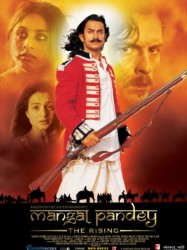
Mangal Pandey: The Rising (2005)
, 2h30Réalisé par Ketan Mehta
Origine Inde
Genres Drame, Biographie, Historique
Thèmes La musique, Religion, Musique, Politique, Religion musulmane, Bollywood
Acteurs Aamir Khan, Rani Mukherjee, Toby Stephens, Ameesha Patel, Kiron Kher, Om Puri
Note64%





Au cours d'une bataille particulièrement meurtrière de la Première guerre anglo-afghane (1839-1842), Mangal Pandey, cipaye du 34e régiment d'infanterie indigène du Bengale, sauve la vie de son officier. Se sentant redevable, le capitaine William Gordon cherche à mieux connaître le soldat indien et, malgré les différences de statut et de race, une profonde amitié naît entre les deux hommes. Le Britannique essaie de protéger son subordonné des brutalités et du racisme de ses compatriotes, alors que l'Indien guide et aide l'officier dans sa lutte contre les pratiques les plus cruelles de la tradition indienne.

Prahaar: The Final Attack (1991)
, 2h48Réalisé par Nana Patekar
Genres Action
Acteurs Nana Patekar, Madhuri Dixit, Dimple Kapadia, Habib Tanvir, Gautam Joglekar, Makarand Deshpande
Rôle Joe D'Souza, Peter's father
Note79%






Hero Hiralal (1988)
Réalisé par Ketan Mehta
Origine Inde
Genres Drame, Comédie, Comédie dramatique, Action, Musical
Acteurs Naseeruddin Shah, Sanjana Kapoor, Saeed Jaffrey, Deepa Sahi, Johnny Lever, Kiran Kumar
Note60%





Naseeruddin Shah is Hero Hiralal, a Hyderabadi Auto-driver, who meets an upcoming Bollywood starlet, Roopa (Sanjana Kapoor) and becomes her tour guide. Soon, the two fall in love.

Yeh Woh Manzil To Nahin (1987)
, 2h12Réalisé par Sudhir Mishra
Genres Drame
Thèmes Le thème de l'éducation
Acteurs Manohar Singh, Habib Tanvir, Brij Mohan Shah, Pankaj Kapur, Sushmita Mukherjee, Naseeruddin Shah
Rôle Akhtar Baig
Note75%





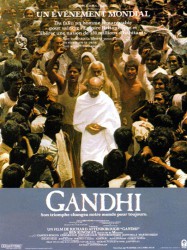
Gandhi (1982)
, 3h11Réalisé par Richard Attenborough
Origine Royaume-uni
Genres Drame, Biographie, Aventure, Historique
Thèmes Afrique post-coloniale, Le racisme
Acteurs Ben Kingsley, Candice Bergen, Martin Sheen, Edward Fox, Roshan Seth, John Gielgud
Rôle Indian Barrister
Note79%





Le film retrace différents éléments célèbres de la vie de Mohandas Karamchand Gandhi et de la lutte pour l'indépendance indienne. Ainsi, on assiste au combat pour les droits civils en Afrique du Sud au début du siècle, à la création de l'Ashram de Sabarmati, au massacre d'Amristar et au mouvement de désobéissance civile qui l'a suivie, à la marche du sel, à la mort de sa femme lors de sa captivité, à l'indépendance et la partition de l'Inde et enfin à son assassinat le 30 janvier 1948.
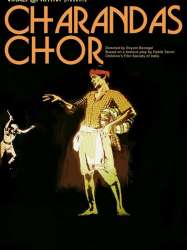
Charandas Chor (1975)
, 2h36Réalisé par Shyam Benegal
Genres Drame
Thèmes Adaptation d'une pièce de théâtre, Films pour enfants
Acteurs Smita Patil, Sundar, Habib Tanvir, Anjali Paigankar
Note77%





The film is derived from a classic folk tale, originally narrated by Vijaydan Detha, and interpreted as folk play by Habib Tanvir. The film charts the tumultuous life of a petty thief, Charandas (Lalu Ram). Curiously he is a man of principles – an honest thief with a strong sense of integrity and professional efficiency. He makes four vows to his Guru, that he would never eat in a gold plate, never lead a procession that is in his honour, never become a king and never marry a princess, thinking all of them are far out possibilities for him. Later, his guru adds a fifth one - never to tell a lie and sets him of on his life's journey which leads him to a kingdom, where the turn of events make him famous, and eventually he is offered the seat of political power which he has to refuse. Later, the local princess (Smita Patil) gets enchanted by him, and proposes to marry him. This is when his refusal costs him his life. As he is put to death, he illustrates the inherent paradox in human existence, where truthful existence becomes an impossibility, for the truthful and the accidentally truthfuls, alike.
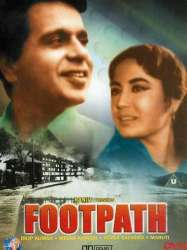
Footpath (1953)
Genres Drame
Acteurs Dilip Kumar, Meena Kumari, Achala Sachdev, Jankidas, Syed Ishtiaq Ahmed Jaffery, Habib Tanvir
Note76%





Tired of being poor, Noshu, a newspaperman abandons his scruples and starts to make money as a black marketeer. He gains his fortune but ruins his brother's life causing him to lose his job, his home and his wife whilst simultaneously losing his own self-respect and that of his former neighbours and his girl. Tormented by his conscience, he writes an expose of the illegal trade but cannot prevent his own brother becoming a victim when an epidemic rages unchecked because criminals have stock-piled all the medicine.

Rahi (1953)
, 2h19Réalisé par Khwaja Ahmad Abbas
Genres Drame
Acteurs Dev Anand, Nalini Jaywant, Habib Tanvir, Balraj Sahni, Manmohan Krishna Chadha, Achala Sachdev
Rôle Ramu
Note67%





Dev Anand is an ex-army officer who gets a job in a tea estate. He is hired as a an over-all manager by the English owners. Anand proves a loyal and diligent worker meting out punishment to the workers on the behest of his owners. He falls in love with one of the tea-picking girls (Nalini Jaywant). The workers rebel against the harsh and sometimes brutal management of the estate owners. Nalini Jaywant is shot by the owner in the rioting when the workers get out of control. A gradual change has also come over Anand, especially in his dealings with the tea workers, and losing interest, he leaves the place.
Producteur

Badal (2000)
, 2h53Réalisé par Raj Kanwar
Genres Drame, Action, Policier, Romance
Acteurs Bobby Deol, Rani Mukherjee, Mayuri Kango, Ashutosh Rana, Amrish Puri, Ashish Vidyarthi
Rôle Producteur
Note50%





Badal (Bobby Deol) is a young man with a tragic childhood. As a child, he had witnessed his entire family, his loving father, mother, and baby sister, murdered in a village massacre by ruthless police officer Jaisingh Rana, who kills people for fun. Years later, Badal has become a dreaded terrorist whose main target in life is exacting revenge on Jaisingh Rana for his family's horrible death. In this endeavor, Badal travels to a small town, where he meets a good-natured police officer, Ranjeet Singh (Amrish Puri), who takes Badal under his wing, and Rani (Rani Mukerji), a bubbly free spirit who falls madly in love with him. Ranjeet Singh's family eventually takes Badal in as a son. Through both Singh's family and Rani, Badal is given a new lease of life and comes to understand the values of sentiments, love and relationships, all of which he has missed out on in his life.
 Connexion
Connexion





